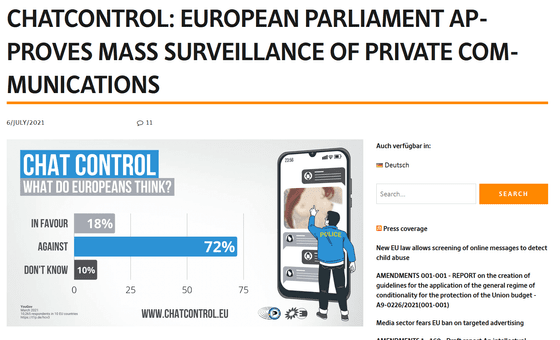A law that requires companies to check for child pornography in SNS exchanges has been passed in the EU, and criticism that it 'injures children'

Parliament adopts temporary rules to detect child sexual abuse online | News | European Parliament
https://www.europarl.europa.eu/news/en/press-room/20210701IPR07503/parliament-adopts-temporary-rules-to-detect-child-sexual-abuse-online
EU Parliament lets companies look for child abuse on their platforms, with reservations – POLITICO
https://www.politico.eu/article/european-parliament-platforms-child-sexual-abuse-reporting-law/
New EU law allows screening of online messages to detect child abuse – EURACTIV.com
https://www.euractiv.com/section/data-protection/news/new-eu-law-allows-screening-of-online-messages-to-detect-child-abuse/
Chatcontrol: European Parliament approves mass surveillance of private communications – Patrick Breyer
https://www.patrick-breyer.de/en/chatcontrol-european-parliament-approves-mass-surveillance-of-private-communications

On July 6, the European Parliament endorses a bill that temporarily relaxes regulations on the Electronic Communications Privacy Directive (2002/58 / EC), allowing web service providers to voluntarily scan child abuse content. It was passed with 537 votes, 133 votes against it, and 24 votes withdrawal.
This bill is a time-limited law that is valid for up to three years until another new law is enacted to strengthen the prevention of child abuse, and covers non-voice communications such as text, images, and videos exchanged via email and SNS. Companies that discover child abuse-related communications on their services can suspend their emails and posts and notify law enforcement agencies. In this bill, it is up to the company to check the user's communication content, but the additional bill, which is scheduled to be passed in the fall of 2021, will screen all carriers. It is a mandatory policy.
'Sexual abuse of children is a horrific crime that tramples human rights. The deal requires the need to detect child sexual abuse online and protects privacy,' European Parliament Rep. Birgit Sippel said in a statement. It's a compromise with Sippel's request. It may not be perfect, but it will be a valid temporary solution for the next three years. '
However, some European Parliamentarians who participated in the vote have accused the debate of being swift. 'When we asked critical questions about the bill, we immediately got a response that we were'not committed to fighting child sexual abuse,'' Sophie Intwert said the day before the election day. talked.

Patrick Breyer, a member of the European Parliament and a member of the German Pirate Party , who advocates freedom of the Internet, said, 'The adoption of the EU's first large-scale surveillance regulations has led to abuse victims and the press. It's a sad event for all who support free and confidential communication. Indiscriminate scanning doesn't protect children, and on the contrary, private photos of children are revealed to someone or the children themselves are made criminals. It puts children at risk, and if it were to prevent sexual abuse, it would take years to step up investigations into child pornographic sites and scrutinize seized data. It would be better to break through the current situation. '
There are concerns not only for privacy reasons, but also for security reasons. In an article contributed to the IT news site Computer Weekly, Mr. Breyer said, 'It is necessary for humans to manually check whether the content detected by the algorithm is actually child abuse. Needs a backdoor to see what's being communicated, which puts the security of end-to-end encryption at a fundamental risk. '
The European Parliament commented on the outlook for the future, saying, 'This revision of the law will be applied to web services even after the European electronic communication code, which includes thorough consumer protection, will be fully applied from December 2020. It was necessary for providers to voluntarily counter the spread of child sexual abuse content. Authorities plan to develop a more permanent solution to address this issue by the end of 2021. That's it. '
Related Posts:
in Web Service, Security, Posted by log1l_ks







